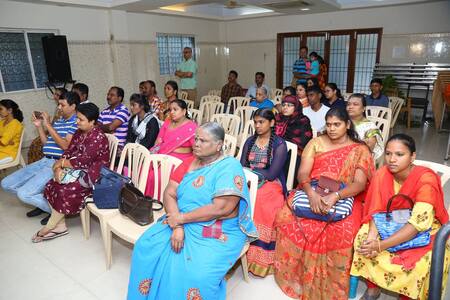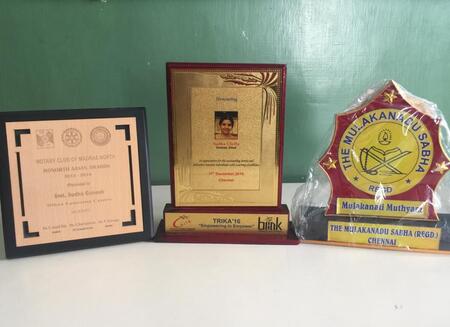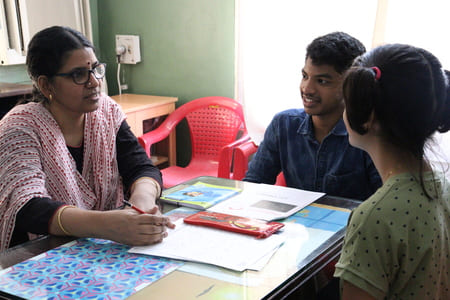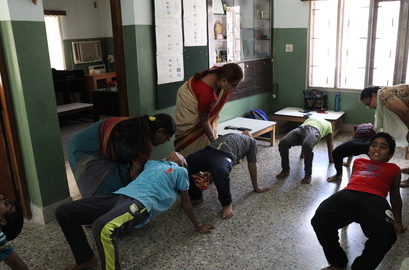“Everyone in the school knew me – from the ayah to the School Principal”.
“How do you expect me to promote her? “
“Please meet the Principal with her papers and report card.”
“She never used to show me her report card”
“How can we help her?”
“Why my daughter? Why me?”
Over the years, in my experience as a special educator for dyslexic children, I have seen that the anxiety of the parents builds up even as the examination time table is announced. These parents and their children often draft their own schedule for studies, create their own model question papers, give a lot of written practice and prepare their children to the best of their abilities.
But,
All these efforts are not always successful. Marks in various subjects are full of rude shocks and occasionally some pleasant surprises too!
The child brings home incomplete, untidy answer papers, quite often with remarks from the teachers. Most often the child fails in at least one or two subjects.
Parents (especially the mothers) go through a range of emotions as they receive these answer scripts one by one – anger, disappointment, frustration, shame, guilt and more. After these initial reactions, parents start analyzing the answer papers and point out places where the child could have been granted better marks and helped him or her pass the exam.
Then arrives the big dreaded day – the PTA meeting day. They wonder of this all that they have to show in their meeting with teachers in the parent teachers meetings that they typically attend, at least thrice a year.Many parents have told me that their anxiety builds up even as they drive to the school for the meeting.
It must be pointed out that the structure of these meetings varies from school to school. Some schools insist that the child should be present. Others have separate days for the “failed students”. Some schools insist that the parents alone should come. Quite often other parents are either present or can overhear the exchanges between the parent and the teacher.
Most often, if it is the final exam, parents may be asked to meet the Principal and that can lead to a lot of anxious waiting. All in all, it is a very difficult experience. Some teachers who understand the child and his challenges may be empathetic and appreciate the child’s effort and improvements. Some teachers may blame the parents for not investing enough time for coaching or teaching the child.
They may critique the entire answer script and point out all the things that are wrong – hand writing, spelling, and sentence structure. In cases where the parent becomes defensive, the entire interaction can become very unpleasant. So, how can parents deal with this? Do they have to reconcile to this reality or can they learn to proactively manage it?
It is my view that despite this seemingly daunting situation, it is possible for parents to learn to proactively manage the meetings and outcomes effectively.
As a first step, I go through each answer script in detail with the parents and find ways to reassure them without blaming the teacher.
Through a series of interactions that follow, I help parents recognize that the Parent-Teacher meetings are not a one-off occurrence but a recurring event throughout the child’s school years. Therefore they need to equip themselves with an objective approach and learn to manage it with the least amount of stress.
Here are some of the strategies that I recommend:
- Get in touch with your emotions. Be aware of what is happening to you emotionally as a parent and deal with it. Don’t unnecessarily catastrophize. Don’t pass the blame either to the child or the teacher. Most importantly, ensure that you don’t come home and displace your anger and humiliation on the child. This will only lead to long-term behavioural problems in the child. Realise that this is not about you.
- Recognise that this report card is not the final word about your child’s career or future.
- Understand your child first – his strengths and specific challenges.
- Attend the meetings as a couple.
- Learn to look at it from the teacher’s perspective also. Empathize with the efforts that the teachers have invested and how hard it can be for them too. Openly appreciate teachers who go the extra mile to help you.
- Parents should not swing to the other extreme and run down the teachers or the school in front of the child.
- Follow the teacher’s recommendation in terms of getting any professional help. (Counseling, remedial classes, occupational therapy and so on.)
- Equip yourself with all the concessions that the various Boards grant the child.
- Learn to be assertive with the teachers and the management without being defensive.
- Try to find opportunities to become an insider by supporting the school activities in any way you can.
- It could be volunteering for school activities such as being a scribe or a volunteer in the resource room or going on a field trip with the children or be a part of the fund raiser. This helps build a relationship with the teachers, other parents and the management.
- If you feel that in spite of all your efforts things are not working, be open to changing the school.
There is no denying the fact that the parent teacher meeting can be a traumatic experience for the parent of a dyslexic child in a main stream school, especially in a school that places a premium on academic excellence. It is tough.
However, with timely help and guidance, aided by the right attitude, it is possible to manage these interactions effectively.
-Mrs. Sudha Ganesh Chella




